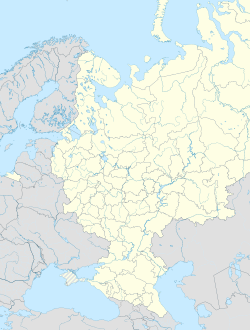Pyatigorsk
| city
Pyatigorsk
Пятигорск
|
||||||||||||||||||||||||||||||||||||||||
|
||||||||||||||||||||||||||||||||||||||||
|
||||||||||||||||||||||||||||||||||||||||
| List of cities in Russia | ||||||||||||||||||||||||||||||||||||||||
Pyatigorsk ( Russian Пятиго́рск ) is a city in Russia with 142,511 inhabitants (as of October 14, 2010) in the Stavropol region and the administrative center of the North Caucasus Federal District . It is located about 600 meters above sea level on the south and south-west slopes of Mount Maschuk on the banks of the Podkumok River .
history
The hot springs in this area were known centuries ago. In 1780, near today's Pyatigorsk, the small fortress Konstantinogorsk was built, next to which a village gradually formed that was named Goryachevodsk (literally "place of hot water"). In 1803 the thermal springs were declared a spa area by a special decree, and the construction of spa resorts began, which became popular with the Russian aristocracy . 1830 Gorjatschewodsk was in Pyatigorsk renamed (literally "city of five mountains"), after the fünfgipfeligen Mountain Beschtau , whose name in the (western Turkey) Karachay-Balkar language Five Mountains means.
Today Pyatigorsk has large administrative and residential buildings, hotels and spa facilities, there is a research institute for balneology there , where spa treatments are studied and the most effective methods of using them are developed. Together with Yessentuki , Kislovodsk and Schelesnowodsk , Pyatigorsk is one of the four North Caucasian mineral water health resorts (also known as Kawminwody ("Caucasian mineral waters"); however - despite the name - Mineralnyje Vody , where there are no mineral water springs at all , does not belong to this group . The surroundings and many of the city's sights are reminiscent of the poet Mikhail Lermontov , who visited Pyatigorsk several times and died there in a duel on July 27, 1841 . The memorial, which is partly located in the house where the poet spent the last months of his life, gives an insight into the life and work of Lermontov, one of the most popular poets in Russia.
Cable car to the Maschuk
During the Second World War , Pyatigorsk was temporarily occupied by the Wehrmacht. The Einsatzkommando 12 of Einsatzgruppe D was based in the city in 1942. Numerous Jewish residents of the city were murdered. On January 11, 1943, the city was liberated by the Red Army .
On February 17, 1963, the "Kosmos" cinema was opened. It was the first big screen cinema in the North Caucasus.
The current station building was built in 1978.
After the collapse of the Soviet Union , a special economic zone was established in Pyatigorsk and other cities in the region in 1994 .
On April 28, 1997, a terrorist attack occurred in Pyatigorsk , during which a bomb was detonated in the waiting hall of the train station. Two people were killed and 17 injured. Chechen separatists claimed responsibility for the attack .
On January 19, 2010, Pyatigorsk was incorporated into the newly founded North Caucasus Federal District.
Population development
| year | Residents |
|---|---|
| 1897 | 18,440 |
| 1939 | 63.162 |
| 1959 | 69,617 |
| 1970 | 93.085 |
| 1979 | 109.901 |
| 1989 | 129,499 |
| 2002 | 140,559 |
| 2010 | 142,511 |
| 2017 | 145.836 |
Note: census data
Ethnic composition
The majority of the population in Pyatigorsk is Russian . There is, however, a traditionally large Armenian minority.
According to the 2010 census, the following ethnic groups live in Pyatigorsk:
- Russians 72.0%
- Armenians 13.4%
- Azerbaijanis 3.1%
- Ukrainians 1.8%
- Kabardiner 1.2%
- Others 8.6%
sons and daughters of the town
- Alexander Bernardazzi (1831–1907), architect
- Vyacheslav Bulytschow (1872–1959), choirmaster and composer
- Joseph Trumpeldor (1880–1920), Zionist
- Nikolai Sarudin (1899–1937), poet and writer
- Antonina Prichotko (1906–1995), physicist
- Pavel Singer (* 1962), pianist and composer
- Alexandra Leonova (born 1964), basketball player
- Anna Omarowa (* 1981), shot putter
- Viktorija Usachenko (* 1982), boxer
- Marina Orlowa (* 1986), actress, singer and poet
- Dawid Awanessjan (* 1988), boxer
Town twinning
useful information
- Discovered on April 18, 1972, the asteroid of the main outer belt (2192) Pyatigoriya was named after the city.
Web links
- Official Website (Russian)
- Unofficial website (Russian)
- Pyatigorsk on mojgorod.ru (Russian)
Individual evidence
- ↑ a b Itogi Vserossijskoj perepisi naselenija 2010 goda. Tom 1. Čislennostʹ i razmeščenie naselenija (Results of the All-Russian Census 2010. Volume 1. Number and distribution of the population). Tables 5 , pp. 12-209; 11 , pp. 312–979 (download from the website of the Federal Service for State Statistics of the Russian Federation)
- ↑ Jonathan Littell : The Well-Minded - Materials Volume. Berlin 2006. p. 66
- ^ The Jewish Foundation for the Righteous: Russia // Kira Belkova
- ↑ Archived copy ( memento of the original from January 16, 2015 on WebCite ) Info: The archive link was inserted automatically and has not yet been checked. Please check the original and archive link according to the instructions and then remove this notice.
- ↑ Гости из венгерского Хевиза поздравляют город-побратим с 238-летием , pyatigorsk.org , September 8, 2018 (Russian)














